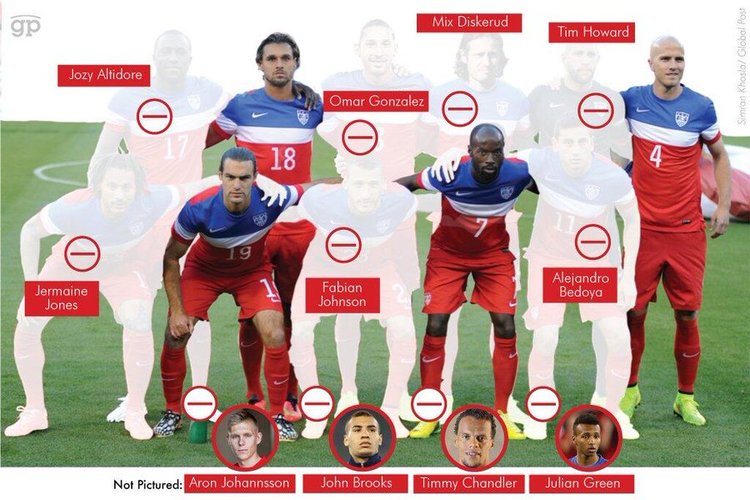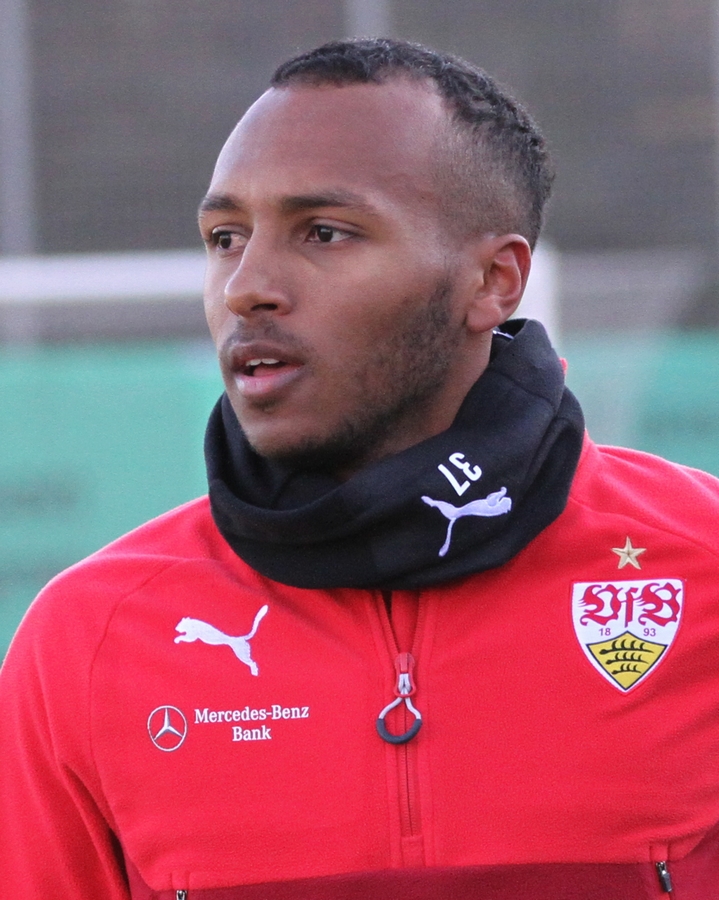
The National Question Front And Center At World Cup — Just What Are We Rooting For?
06/30/2014
Immigrants help drive America’s success, even in the World Cup! Look at what #USMNT would be without them. #TimeIsNow pic.twitter.com/D550KRnc7W
— Nancy Pelosi (@NancyPelosi) June 17, 2014
The 2014 FIFA World Cup is supposed to be an international soccer competition between the nations of the world but many of the players have nothing to do with the countries they ostensibly represent. The U.S. is perhaps the outstanding example, with some of the team’s most important players spending virtually all their lives outside the country. The flag-waving spectacle of the World Cup has become a farce — and yet another excuse for the Treason Lobby to beat the drum for ever more immigration.
The data visualization website Codehesive has a useful interactive chart showing that many of the players in the World Cup have either tenuous connections to the countries they represent, or stronger connections to other countries throughout the world. [Brazil 2014: Visualizing ancestral and international connections between teams, by James Offer, June 2014]
Some of the most influential countries in the competition aren’t technically in it at all. Albania may not have qualified this year, but that doesn’t mean it wasn’t represented — five of its native sons suited up for different teams: for Switzerland (twice) Germany, Greece, and Belgium.
Switzerland may have a reputation for immigration patriotism, but few players on its team come from the country’s predominant ethnic groups. Instead, there are players from Bosnian, Turkish, Croatian, Cape Verdean, and Ivorian backgrounds.
Even Italy, a team noted for its ethnic homogeneity, featured Mario Balotelli, (right) a striker of Ghanaian origin who bounces to a new league almost every season.
By Paul Kersey has astutely pointed out that college football is the opiate of America. But soccer is becoming the soma of the entire world.
And much as college football was used to initiate people into the new nonwhite America, soccer is now being used to promote a globalized world where national identity is of no more consequence than what brand of sneakers you wear.
When USA played Germany last week, several players likely felt conflicting emotions. No less than five of the players on the US team were primarily raised in Germany, with virtually none spending any considerable amount of their lives in the country they were supposedly playing for. [See America’s Milli Vanilli World Cup Team: Black Nature And German Nurture, By Steve Sailer on June 5, 2014]
Even coach Jurgen Klinsmann is a German who formerly represented his Fatherland in the World Cup as a player. Klinsmann previously coached the German team at the 2006 World Cup — it was seen as a coup for American soccer when he signed up. [Leading the charge for Team U.S.A.: Who is coach Jurgen Klinsmann? by Ben Brumfeld, CNN.com, June 26, 2014]
Not surprisingly, Klinsmann has done his best to, as Obama would say, fundamentally transform American soccer. He made headlines after he claimed the US team wasn’t good enough to win the tournament — blasphemy in a culture practically defined by the expectation of victory. ['Unrealistic' for US to win World Cup? Klinsmann can’t be from around here, by Greg Doyel, CBS Sports, June 11, 2014]
He also axed the legendary Landon Donovan, the all-time American top scorer and assist leader, and arguably the greatest ever American player. (They’ve worked together before, and Klinsman doesn’t get on with Donovan.) [Klinsmann’s Donovan omission caps rocky relationship, puts pressure on bold coach, by Grant Wahl, SI.com, May 22, 2014]
However, what was often overlooked was Donovan’s replacement, a young German-American named Julian Green.
Born in Tampa, Green has spent most of his life in Germany, and is likely more comfortable ordering schnitzel than conducting an interview in English.
Green has yet to lodge a minute in the World Cup, but is widely seen as the face of the future US team [The Future of US Soccer: Julian Green Q&A by Yemi Falodun, Astute Magazine, June 2014]
Green is one of the five Germans on the team who are the products of African-American fathers, many members of the US military stationed overseas, and of ethnically German mothers.
Sunil Gulati, president of the United States Soccer Federation assures us these players are no less American than any others. [Gulati: Foreign-Born No Less American, By Doug McIntyre, ESPN.com, June 25, 2014] (Mr. Gulati was born in Allahabad). However, some of the German-American players honestly admitted they had mixed feelings about competing against a country they once represented. [USMNT’S German-Americans Preparing For Emotional Match VS. Germany, By Franco Panizo, SoccerByIves.Net, June 25, 2014].
Other players on the US team have spent the majority of their lives in countries other than the US.
Striker Aron Jóhannsson was raised in Iceland. Midfielder Mikkel Diskerud is Norwegian by birth.
Some players grew up in the USA, but have close links to other countries. Defender Omar Gonzalez is a citizen of Mexico, while backup keeper Nick Rimando has parents from Mexico and the Philippines.
Star striker Jozy Altidore has a parent from Haiti, and midfielder Alejandro Bedoya has one parent from Colombia. Even the long-standing, stalwart US goalkeeper Tim Howard has a parent from Hungary.
The US team has always been filled with players from immigrant backgrounds, but the 2014 team feels more intentional. Despite talk of a new “American style,” it has won games much like the old one: hard work, opportunistic scoring, grit, and a bit of luck saw the US qualify for the knockout stage. The real change is a new emphasis on America as a “proposition nation” — simply importing foreigners to play the soccer that Americans won’t play.
Ironically though, all-American players like Clint Dempsey and Michael Bradley have been critical to this year’s tournament. Although much maligned for his performances, Michael Bradley is playing out of position and has run more miles than any other player in the tournament [Why U.S. Fans Should Hope for Less from Michael Bradley, By Andrew Helms, NewRepublic.com, June 27, 2014]
Meanwhile midfielder Clint Dempsey has scored his usual clutch goals even while suffering through a broken nose. [World Cup: USMNT’s Clint Dempsey has broken nose; Jurgen Klinsmann has treatment plan in mind, by Benjamin Baer, mlssoccer.com, June 17, 2014]
So Americans still get to cheer for an American who can speak English without an accent.
But the team is still being used to push a political agenda. A photograph displaying the immigrant members of the US soccer team was even used by Nancy Pelosi to push Amnesty (above).[Are there immigrants on the 2014 U.S. Men’s World Cup team? Politifact, June 17, 2014].
The Conservative movement reacted in the usual fashion by blubbering about how all the players are “legal” immigrants. But the fact is that this really is the team of the “new America.”
Unsurprisingly, yuppies and hipsters seem to have ironically discovered nationalism, and flock to “watch parties” to cheer on the multicultural faux nation they helped create.
Even the “I Believe That We Will Win” chant of the US supporters sounds like a profession of faith rather than a profession of solidarity with their kinsmen.
The next game is against Belgium, another “proposition nation” with a team that looks like a UN convention. Instead of a competition between two countries, it will just be 22 strangers trying to have a good tournament so they can transfer to a better club team when this is all over.
What America’s World Cup team represents is not what America was or even what it is. It is what our elites want America to become — a proposition nation of strangers, united by hipster nationalism, a parasite on the flag and the emotional ties that still mean something to the historic American nation.
Contemplating this sad spectacle, it’s hard to argue that there’s anything here really worth rooting for.
Email George Rhodes.

